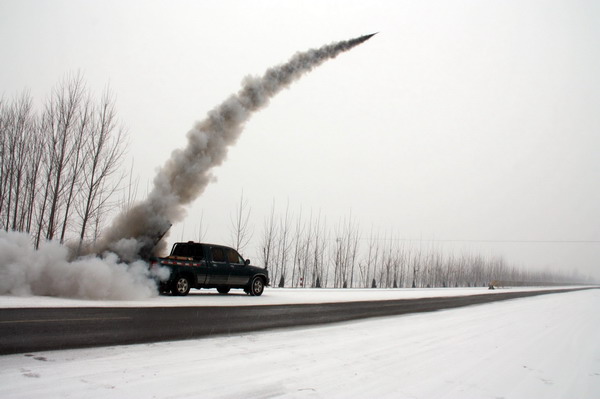Economy
'Drought will not hit world grain prices'
By Wang Qian (China Daily)
Updated: 2011-02-16 07:31
 |
Large Medium Small |
|
 A rocket used to launch chemicals for cloud seeding and increase the amount of snowfall is fired from a pickup truck in Liaocheng city in East China's Shandong province on Sunday. [Photo/Xinhua] |
| ||||
"The recent drought may have some impact on winter wheat production but the authorities are taking active measures to minimize the impact," he said.
China has "abundant" reserves of grain, he added, that are sufficient to meet the nation's needs.
The dry spell in northern China's wheat-growing heartland has caused considerable concern abroad and even sparked a UN warning last week.
If China were to buy a large amount of wheat from overseas because its crops failed, prices on the world commodity markets would surge at a time when food costs are already causing governments headaches.
Associated Press quoted Shanghai-based agriculture analyst Lief Chiang, of Rabobank, as saying on Tuesday that numerous other factors were behind the increase in global wheat prices, including flooding in Australia, drought in Russia and an early frost in Canada.
"Maybe, the drought in China was the straw that broke the camel's back," he said.
Chiang said the drought will put pressure on China's domestic grain and other food prices.
However, experts said China's wheat crops are currently dormant and rain or snow during the next month or two could still mean there will be an abundant harvest.
"Good rains last October, before seeding, provided abundant moisture to get the current crop sprouted and established and in good shape to last the winter," said Jerry Norton, a commodity analyst with the US Department of Agriculture.
And concerns have lessened somewhat since many areas had snow during the weekend, including the major wheat-producing provinces of Shandong and Henan.
In addition, other irrigation projects have also had an impact.
The latest statistics from the Ministry of Agriculture showed that, as of 5 pm on Monday, farmland affected by drought had decreased by about 267,000 hectares to about 6.7 million hectares in eight provinces.
In order to further relieve the drought and guarantee China's food security, the Ministry of Finance on Monday allocated 7.5 million yuan ($1.1 million) for weather manipulation efforts in drought-hit areas.
The ministry and the China Meteorological Administration asked local weather bureaus to make full preparations to look out for favorable weather conditions so weather intervention techniques can be carried out. The weather bureaus are also being asked to cooperate with local agriculture and water authorities in sharing information.
Since October, most parts of central and eastern China, the country's major winter wheat-growing zones, have been without significant precipitation.
As of 6 pm on Monday, China had carried out 2,183 weather manipulation exercises in a bid to encourage precipitation. Teams fired 68,000 rockets containing chemicals and materials that can induce clouds to release water, according to the latest statistics from the administration.
The efforts induced the recent snowfall that has had a positive impact in some areas.
Snow fell twice in northern areas recently, but the ministry said it has only made a limited impression.
Lu Bu, an agricultural resources researcher at the Chinese Academy of Agricultural Sciences, told China Daily the snow fell at the right time and will certainly help.
But the drought is continuing and more irrigation will be necessary, said Yu Zhenwen, head of the wheat expert panel under the Ministry of Agriculture.
At least 50 millimeters of precipitation will be needed to fully relieve the current drought. The recent snowfalls were responsible for about 5 mm, Yu said.
The National Meteorological Center said on Tuesday that no rain or snow is forecast in most drought-hit regions of northern China for the next three days.
In the coming 10 days, drought-hit parts of central and eastern China will likely get snow or rain three times, with around 2 mm falling each time in Gansu and 5 to 8 mm, falling each time in Shaanxi, the center said.



